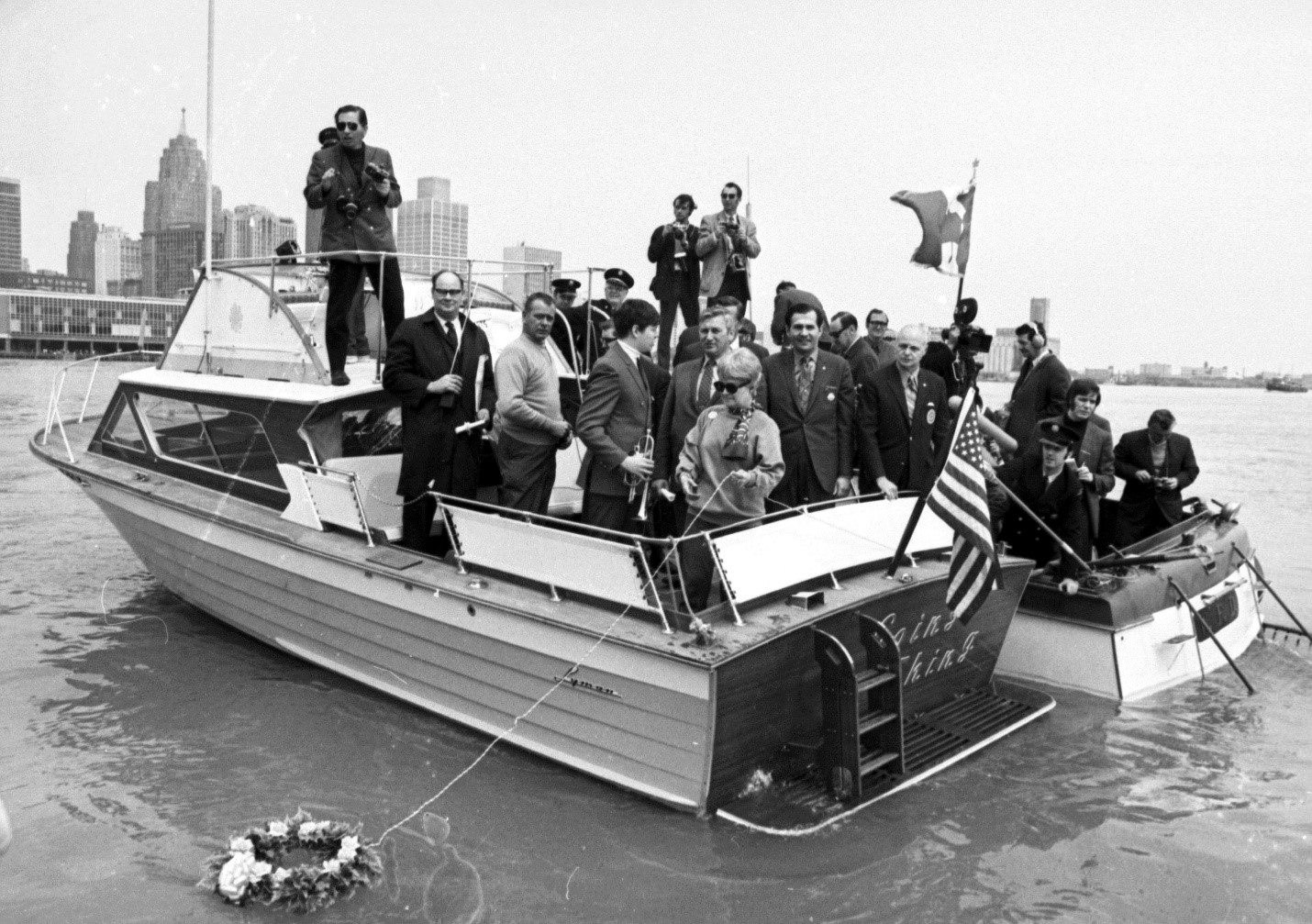Autoworkers’ long history of protecting our environment
April 7, 2025

Great Lakes Moment is a monthly column written by Great Lakes Now Contributor John Hartig. Publishing the author’s views and assertions does not represent endorsement by Great Lakes Now or Detroit PBS.
April 22, 1970 was the first Earth Day. On that day, two boats — one with an American flag representing American autoworkers and one with a Canadian flag representing Canadian autoworkers — met in the middle of the Detroit River to hold a wake, symbolizing the death of the river from pollution.
As is the custom in wakes, a floral wreath was placed on the water. The vice chairperson of the United Auto Workers (UAW) Downriver Anti-Pollution League, who’s referred to in documents from the Walter Reuther Library at Wayne State University only as Mrs. Peter Naccrato, quickly retrieved the wreath from the Detroit River.
“I don’t want the flowers to get contaminated,” said Naccrato.
For this first Earth Day, the UAW’s Downriver Anti-Pollution League issued a resolution stating: “We, the citizens of Michigan, especially those of us living along the Detroit River, realize that the pollution from American companies along the river affects not only us but our Sisters and Brothers on the Canadian side. We are demanding that our government take more stringent measures against corporations, municipalities, and other sources of pollution.”
Public outcry over pollution helped raise public awareness about environmental issues and put them on national agendas. This prompted political action to protect the environment by mobilizing large numbers of people to demand stricter environmental regulations. This environmental activism ultimately led to the passage of:
- The Canada Water Act of 1970;
- The U.S. National Environmental Policy Act of 1970;
- The U.S. Clean Water Act of 1972.
- The U.S.-Canada Great Lakes Water Quality Agreement of 1972.
- The U.S. Endangered Species Act of 1973.
This also led to the establishment of the U.S. Environmental Protection Agency in 1970 and the Canadian Department of the Environment (now called Environment and Climate Change Canada) in 1971.
Today, over one billion people from more than 92 countries participate in Earth Day celebrations to continue raising awareness about the environment’s health and encouraging people to take action to protect the planet. You might be surprised to learn that autoworkers now have a 100-year history of protecting our environment.
In his book titled Making a Living: Work and the Environment in the United States, Chad Montrie notes that: “Starting in the 1920s a growing number of male autoworkers and other factory hands living in and around Detroit attended to a newfound sense of estrangement from the natural world by hunting and fishing. To support those activities, they formed or joined local sportsmen’s clubs, which held regular meetings and published monthly newsletters, and they established a state organization, the Michigan United Conservation Clubs, which worked with existing conservation groups to lobby the legislature on fish and game laws.”
Automobile and other factory workers’ firsthand experiences with water and air pollution put them at the forefront of efforts to control pollution and benefit from outdoor recreational pursuits like fishing and hunting.
Walter Reuther was president of the UAW from 1946, until he died in 1970. Under Reuther’s leadership, the UAW helped establish an autoworkers’ environmental consciousness that led to advocacy to prevent and control pollution. Indeed, it was the UAW’s interest in promoting recreational and leisure activities for its workers, and the workers’ growing interest in protecting the environment, that led to the development of a working-class environmental consciousness and a labor environmentalism that we all benefit from today.
This can be seen in the 1967 statement, adopted by the UAW’s International Executive Board: “As we bargain for more time off the job in the form of more paid holidays, longer vacations and early retirement, we must also be concerned that this time can be utilized in the kinds of surroundings that will bring some measure of pleasure, satisfaction, and enjoyment to our members and their families. Our Union has demonstrated time and time again that its responsibility to its members does not end with the punching out at the time clock, and that the conservation issue is as vital to us as any we have previously undertaken.”
The first Earth Day was organized and led by U.S. Senator Gaylord Nelson from Wisconsin, who envisioned it as a nationwide “teach-in” to raise awareness about environmental issues. He recruited Denis Hayes, a young student activist against the Vietnam War, to organize campus teach-ins. Hayes and a coalition of environmental groups spearheaded this nationwide “teach-in,” but a key supporter was the UAW which provided substantial financial and operational assistance, allowing the event to reach a large audience nationwide.
In his book Silent Spring Revolution, Douglas Brinkley noted that “Reuther led the UAW to become the most vocal organization in America demanding pollution control and nature conservation for workers.” Brinkley continued: “Without Reuther, there would have been no Earth Day.” Later in his career, Senator Nelson acknowledged that the UAW and other labor unions became important constituencies in the modern environmental movement.
When the UAW (now called the United Automobile, Aerospace and Agricultural Implement Workers of America) was founded in 1935, Canadian auto workers were initially part of the Canadian Region of the UAW. In 1985, Canadian autoworkers split from the UAW, forming the Canadian Auto Workers or CAW (now called Unifor, established in 2013). Today, both the UAW and Unifor remain champions of improving the lives of working people by advocating for better wages, health care and working conditions, including protecting the environment. Both these labor unions are leading the fight for a just transition so the shift to cleaner vehicles truly benefits workers and the environment.
UAW members are doing their part by fighting for and winning important just transition provisions through bargaining and organizing at new electric vehicle and battery plants across the country. UAW members of Ford, General Motors and Stellantis have used their power to win critical investment commitments, job security provisions and job quality standards to ensure workers are not left behind in the transition to cleaner vehicles.
The UAW Conservation and Resource Development Department works to educate members and the community about environmental issues. The group mobilizes grassroots support for policies that strike the proper balance between economic growth and protecting our natural environment.
In addition, the UAW has advocated for the renewal of the Clean Air and Clean Water Acts, supported policies that account for carbon emissions and labor standards when purchasing materials for public infrastructure, implemented training programs for health and safety training to UAW and community members, and developed a Green Door Environmental Technician Program that creates green jobs in Detroit.
A good example of autoworker advocacy resulting in action occurred in 2023 when the UAW won a historic commitment from General Motors to include battery production under the UAW’s national master agreement. This guaranteed that the General Motors conversion to electric vehicles would be a just transition in the clean energy revolution that brings good union jobs to communities across America.
Just last month, the UAW had another autoworker victory in organizing at an electric vehicle (EV) battery plant in Spring Hill, Tennessee. UAW members at Local 1853 overwhelmingly voted to ratify their first local agreement with Ultium, a joint venture of General Motors and LG Energy Solution. This agreement ensures fair pay, benefits and worker safety in the manufacture of EV batteries which is just as risky as manufacturing combustion engines. And, equally as important, this labor agreement sets a precedent for a brighter future for other autoworkers in southern states.
It is also worth highlighting that the 2020 United States-Mexico-Canada Agreement (USMCA), which replaced the North American Free Trade Agreement (NAFTA), will be up for review in 2026 for potential renegotiation. The UAW has made improving worker and environmental protection one of its core demands on a renegotiated USMCA.
“The UAW is fully committed to helping build a just, new, green economy,” said Rachel Gumpert, assistant director of communications for the UAW. “As the UAW likes to say — we want bread, but roses too. The UAW wants to be part of dreaming bigger to ensure its workers, their families and communities have healthy environments and green spaces that provide recreational opportunities for all.”
Similarly, Unifor/CAW has always taken a robust position on protecting the environment from a labor perspective for its membership and local communities. In the 1980s, Unifor fought for and won the establishment of a Workplace Hazardous Materials Information System that provides information on how to safely use hazardous materials in the workplace, including hazard identification, product labeling, safety data sheets and worker training.
Since 1999, Unifor has had a Joint Workplace Environment Committee made up of union members and management to find ways to reduce waste to landfills, reduce the carbon footprint, save money through pollution prevention, and improve community outreach.
Since the 2015 United Nations Climate Change Conference (COP 21) that led to the Paris Agreement on Climate Change, Unifor has worked with others in the labor movement to lobby national governments on actions to ensure that all workers are fully prepared and protected and have a meaningful say in how the transition unfolds to cleaner vehicles. Seven principles guide this work on just transition:
- Respect for workers, unions, communities and families.
- Worker participation at every stage of transition.
- Transitioning to good jobs.
- Sustainable and healthy communities.
- Planning for the future, grounded in today’s reality.
- Nationally coherent regionally driven, locally delivered actions.
- Immediate yet durable support.
In response, Unifor became a strong advocate for Bill C-50 respecting accountability, transparency and engagement to support the creation of sustainable jobs for workers and economic growth in a net-zero greenhouse gas emissions economy in the Canadian Parliament. This bill passed in 2024 and is now known as the Canadian Sustainable Jobs Act.
Locally in Windsor, Ontario, Unifor lobbied for and changed a provincial law to ban pesticides on school playgrounds and public parks. It also lobbied the Windsor City Council to purchase 18 electric buses made in Canada. Most recently, Unifor’s Windsor Environment Committee, including Local 444, supported Member of Parliament Brian Masse’s private member bill (C 248) to establish Ojibway National Urban Park in Windsor. On March 8th, Parks Canada received $36.1 million CAN in federal funding over five years to establish this national urban park, as well as $4.6 million per year to support its operations.
“The environmental advocacy work that began decades ago continues to inspire us as we educate members about their role in building a sustainable future,” said Joanne Hay, director of health, safety, and the environment at Unifor. “We are just as committed today as our union predecessors were 55 years ago. We know the key to creating a sustainable future is to ensure it works for workers.”
John Hartig is a board member at the Detroit Riverfront Conservancy. He serves as a Visiting Scholar at the University of Windsor’s Great Lakes Institute for Environmental Research and has written numerous books and publications on the environment and the Great Lakes. Hartig also helped create the Detroit River International Wildlife Refuge, where he worked for 14 years as the refuge manager.
Catch more news at Great Lakes Now:
Great Lakes Moment: Detroit River common terns under threat
Great Lakes Moment: Rouge River oxbow enhances education at The Henry Ford
Featured image: United States and Canadian auto workers hold a wake on the Detroit River on the first Earth Day, April 22, 1970. (Photo Credit: Wayne State University’s Walter P. Reuther Library)
Search
RECENT PRESS RELEASES
Related Post


